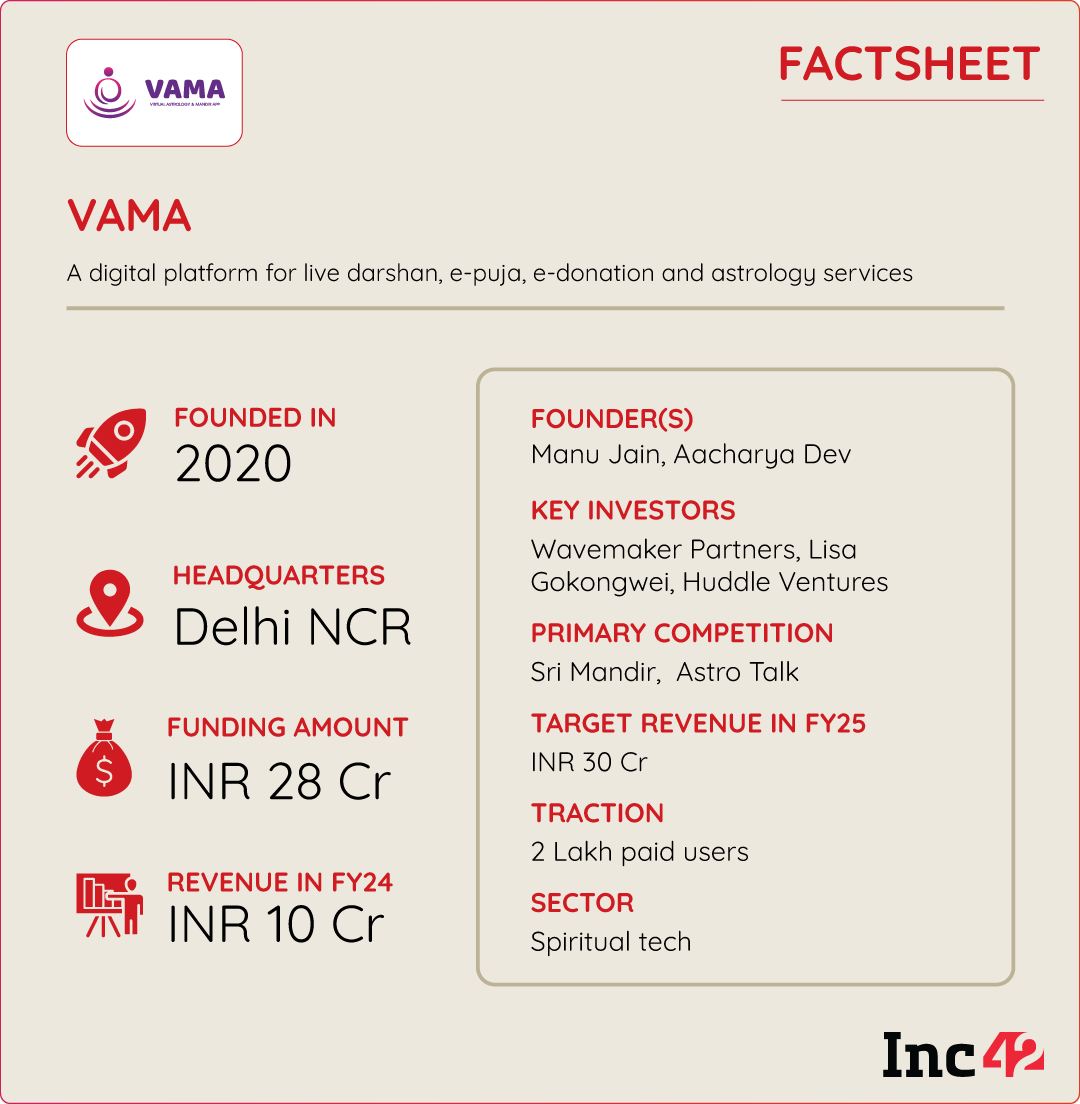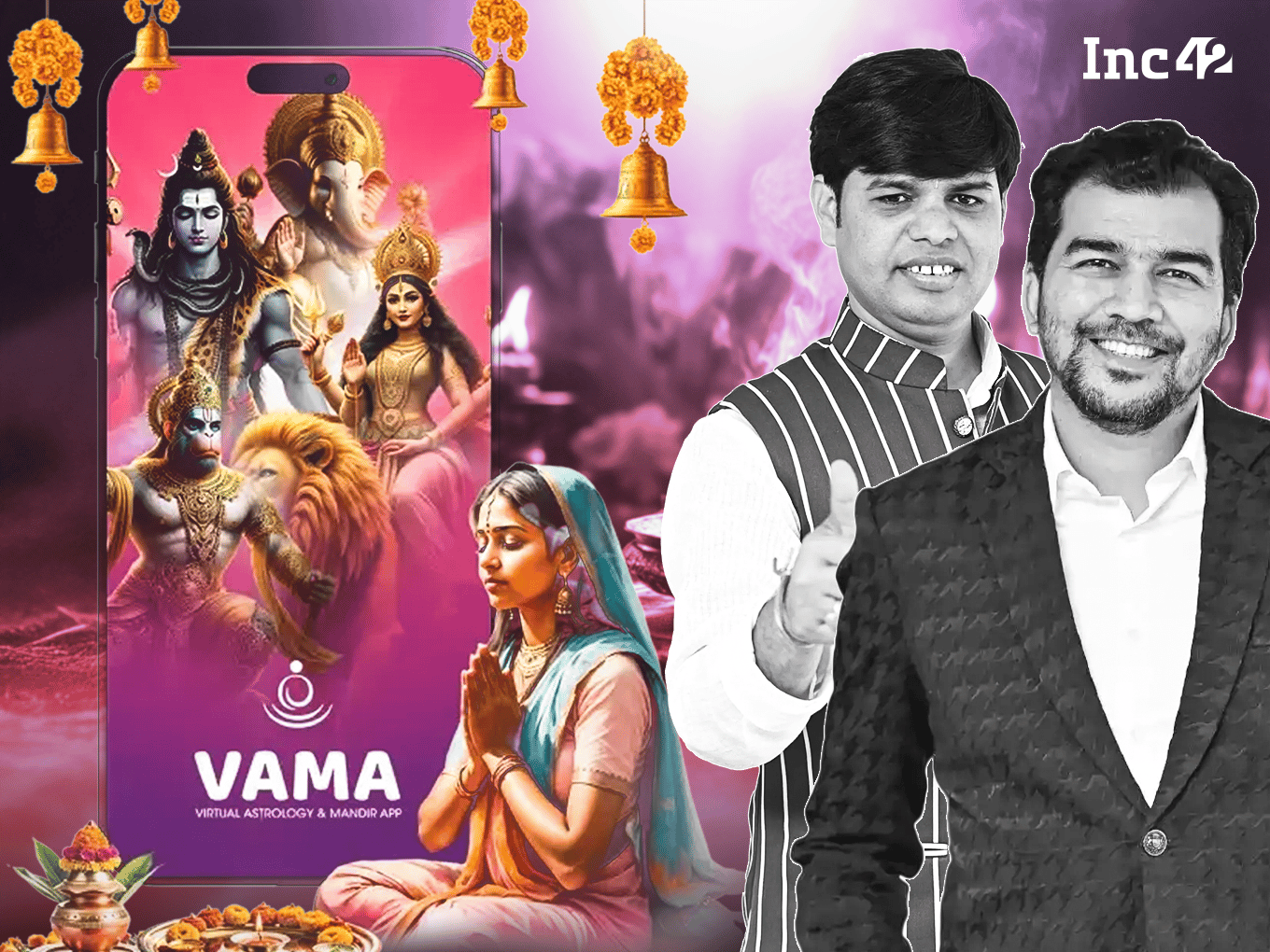The startup provides a 360-degree spiritual experience online through e-darshan, e-puja, e-donation and astrology consultation and ensures maximum authenticity
It has onboarded 250 temples for e-puja services and 300+ astrologers to expand its user base and services in Tier I and II cities
VAMA aims to reach a Paying Monthly User Base of 100,000 Users per month
In Covid times and the post-Covid era, the country has witnessed a remarkable resurgence in spiritual interest, even among Gen Z. Moreover, in a digital-first world, spirituality, too, has found its online niche and given rise to a roaring business. A new genre of entrepreneurs now leverages technology to connect people with temples, rituals and traditional practices like astrology to offer a seamless spiritual experience with the help of a few clicks.
However, astrology consultations on digital platforms should not be considered as the spread of superstition and pseudoscience. These are mere spiritual guidelines and cannot be used for fructifying purposes.
When VAMA (short for Virtual Astrology & Mandir App) was set up in late 2020 by telco professional Manu Jain and a third-generation astrologer, Aacharya Dev, who was a consultant at the company where Jain worked, it was a well-thought-out initiative.
For years, Jain had observed the consistent popularity of astrology among all content offerings provided by telecom operators. But most of the content lacked authenticity as the professionals concerned were not curated by the platforms promoting them. Similarly, several businesses used to offer e-darshan (virtual darshan) of temples and deities and online puja bookings. However, it was a largely unorganised market, and devotees could not determine if a full-fledged puja/yajna had been conducted satisfactorily.
Realising India’s booming digital ecosystem could transform how millions of people follow their religious and spiritual pursuits, VAMA founders developed an intuitive platform for e-darshan, e-puja, e-donation and astrology consultation. The aim was to cater to the growing demand for a 360-degree spiritual experience online and ensure maximum authenticity.
The founders’ complementary skills – Jain’s strong background in business strategy and operations and the other’s deep insights into rites, rituals and user requirements – turned out to be an excellent combination for starting a venture like VAMA.
“We recognised that the modern and the tech-savvy, especially millennials and Gen Z, value convenience that aligns with their fast-paced lifestyle. So, we aimed to make our offerings more accessible, authentic and relevant to the younger generation,” said Jain.
VAMA has raised INR 28 Cr from a clutch of VCs and angel investors and adopted a marketplace model. It has onboarded 250 temples for e-puja services and more than 300 astrologers. It has already conducted 2,00,000 e-pujas and expanded its services to 20+ Tier I and II cities across northern and central India. Users pay for its astrology services and the e-pujas they want to perform.
The revenue model is straightforward. Most of VAMA’s earnings come from revenue-sharing with temples conducting e-pujas; the rest comes from astrology and other services. The startup handles marketing and technology, enables live darshans and validates e-puja processes through live streaming (more on its tech stack later). On the other hand, the temples do what they do best: Conduct pujas, which help them generate additional income by serving a vast pool of e-users.. It is eyeing INR 30 Cr in revenue in the current financial year, a 200% jump from FY24.

A Deep Dive Into Early Challenges And VAMA’s Five Success Strategies
A key challenge faced by spiritual tech startups like VAMA is to overcome doubts and scepticism surrounding e-puja services. People who cannot travel in person and attend these pujas are unsure whether the rituals have been done as per the scriptures, preserving their sanctity and authenticity. VAMA uses digital tech and a high degree of curation so that the essence of these traditional rituals is never diluted. Here is a quick look at its five pillars that guarantee trust and qualified guidance.
Curation, curation and curation: Nothing is left to chance, whether partnering with temples for remote pujas or building a network of highly qualified astrologers. VAMA has tied up with some of India’s biggest and best temples for e-puja services and only listed the best astrologers through a rigorous vetting process.
Building trust & convenience through tech: “Before VAMA, some devotees used to watch e-puja services via WhatsApp video calls. But those were not well organised or followed a strict set of rules. With VAMA’s services in place, users can perform any puja of their choice in any registered temple with complete transparency and proper guidelines,” said Jain. Apart from educating people about the authenticity and benefits of digital puja services, VAMA has built a seamless technology platform capable of hosting live pujas and high-definition consulting for astrology services.
Service personalisation through data analytics: Another standout feature is VAMA’s commitment to service personalisation. The platform uses data analytics to match astrology consultants with users based on the latter’s specific requirements and past preferences. This helps people connect with astrologers best suited to address their concerns. Additionally, pujas can be customised, allowing users to specify their ritual preferences.
Effective customer interactions and greater reach: VAMA has built a proactive customer service team to address concerns promptly, offer alternative solutions and enable refunds when necessary. It also collects user feedback to improve its services and continuously enhance customer satisfaction.
Its customer acquisition strategy combines digital and traditional marketing channels to ensure a wider reach. Social media, content marketing and partnerships with spiritual influencers are also leveraged for better brand recall. Additionally, word-of-mouth promotion and offline collaborations with temples/religious organisations are critical in driving credibility. Interestingly, the app has seen 2 Mn downloads since its rollout.
It is also pertinent to note that VAMA has managed to scale while keeping its operating costs low.
“We have always been CM double digit positive (contribution margin is total sales revenue minus variable costs) and have consistently achieved more than 10%. As we scale our revenue, we see burn reducing, and at 2x our current scale, we see positive EBITDA,” said Jain.
Can VAMA Crack The Global Market And Serve The Diaspora?
As VAMA continues to expand, its growth trajectory looks promising. The platform claims 2 Lakh transacting users but aims to reach 10 Lakh within two years. This will be driven by increasing its temple network from 250 to 500, thus broadening its reach, products and services. It will also enter the rapidly rising NRI market to serve millions of Indians living abroad.
Globally, the spiritual products and services market is estimated to reach $249 Bn by 2032 from $180.2 Bn in 2024 as more people seek holistic solutions for mental and spiritual well-being. The religious and spiritual market in India reached approximately $58.6 Bn in 2023. It is expected to grow at a CAGR of 10% during 2024-2032 to surpass $138 Bn.
If VAMA (and its ilk) remain committed to making spiritual services accessible, authentic and transparent in a digital-first world, they can grow in sync. Catering to the diaspora will be a lucrative opportunity if the startup and its peers are at the forefront of a new-age spirituality where technology helps the devout celebrate their faith and rituals despite the physical distance and the demands of a fast-paced life.




 Fintech
Fintech Travel Tech
Travel Tech Electric Vehicle
Electric Vehicle Health Tech
Health Tech Edtech
Edtech IT
IT Logistics
Logistics Retail
Retail Ecommerce
Ecommerce Startup Ecosystem
Startup Ecosystem Enterprise Tech
Enterprise Tech Clean Tech
Clean Tech Consumer Internet
Consumer Internet Agritech
Agritech






























